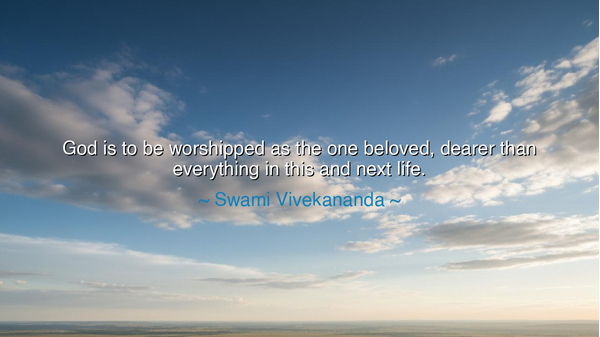
God is to be worshipped as the one beloved, dearer than
God is to be worshipped as the one beloved, dearer than everything in this and next life.






“God is to be worshipped as the one beloved, dearer than everything in this and next life.” Thus spoke Swami Vivekananda, the lion of India, the sage whose voice carried the thunder of the Upanishads into the modern world. In this saying lies the essence of divine love, the highest truth of all faiths — that God is not to be feared as a judge, nor bargained with as a master, but adored as the Beloved, with the tenderness of the heart and the purity of the soul. For to love God is not merely to pray or to believe, but to be consumed, transformed, and made radiant by that love.
Vivekananda, the disciple of the saintly Sri Ramakrishna, had tasted this fire of devotion. His teacher taught him that the divine is not an idea to be analyzed, but a presence to be felt — a sweetness that fills the heart until all other desires fade like stars before the sun. When Vivekananda spoke these words, he spoke not of theory but of experience: that one must love the Infinite as one loves the most cherished soul, and even more — dearer than life, dearer than heaven itself. Such love is not weak sentiment, but the most powerful force in existence, for it dissolves the boundaries between the human and the divine.
To worship God as the beloved is to see divinity in all things — to love the Creator through creation. It is to look upon every being, every flower, every drop of rain, and whisper, “Thou art That.” The soul that has tasted this love no longer seeks power, wealth, or fame; for it has found something greater, something eternal. It does not say, “Give me,” but “Take me.” It does not pray for comfort, but for closeness. And in that surrender, it becomes free.
Consider the life of Mirabai, the princess who forsook her throne for the love of Krishna. Her family called her mad; her people whispered that she had lost her reason. Yet she sang in the streets, her heart aflame with longing for the divine. She said, “My only Lord is the blue flute-player; all else is illusion.” She drank poison given by her enemies — and legend says it turned to nectar upon her lips. Such is the power of divine love, when the heart holds nothing dearer than the Beloved. She did not seek heaven, for she already lived within it, carried upon the wings of devotion.
This is the spirit Vivekananda urged upon the world — not dry religion, not hollow ritual, but living worship, where every act, every breath becomes an offering. He saw that true religion begins not with fear, but with love. Fear binds; love liberates. Fear says, “I am small and Thou art great.” Love says, “I am Thine, and Thou art mine.” In the fire of such love, the soul forgets itself — and in that forgetting, it awakens to the divine truth that God and man are one.
And yet, this love is not easy. To love God above all is to release the chains of attachment — to things, to pride, to ego. It demands courage to love without condition and discipline to keep that flame alive amidst the noise of the world. It asks that we turn every sorrow into a song, every failure into faith. This love is not blind; it is all-seeing. It recognizes the divine even in suffering, saying, “This too is from my Beloved.”
So, O children of the Eternal, let this be your path: worship God not with fear, but with love. Let your devotion be not a duty, but a longing. Seek the divine not only in temples and scriptures, but in your neighbor’s smile, in the cry of the poor, in the quiet of your own heart. Speak to God as you would to your most cherished friend — with honesty, with tenderness, with trust.
For when you love the Divine Beloved above all, you need seek nothing else. Heaven and earth lose their power over you. Life and death become but waves upon the same ocean. And in that ocean, the soul at last finds rest — not in arrival, but in endless union. Thus is the meaning of Vivekananda’s words fulfilled: that to love God is the greatest art, the highest worship, and the eternal liberation of the heart.






AAdministratorAdministrator
Welcome, honored guests. Please leave a comment, we will respond soon